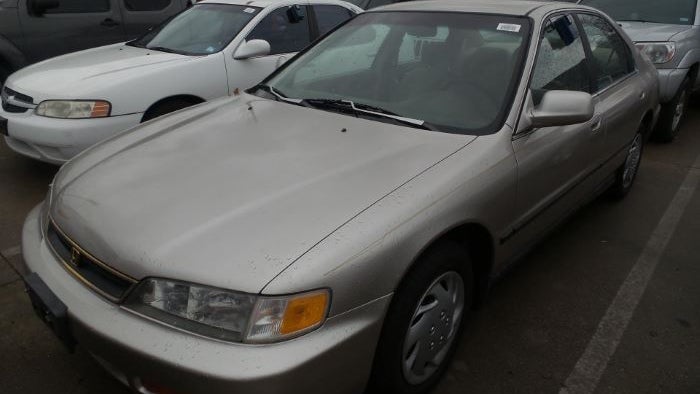Why Do Old Hondas Cost So Much?
Used car prices for older Hondas often reach sky high levels. Is that price premium worth it?

I saw two 20+ year old Honda Accords go through an auto auction last Tuesday. One automatic, the other stick. Both were four door sedans.
Nothing special or sexy about either one of them.
The first had a five-speed manual and the ABS light on. Usually non-sporty sedans with stickshifts bring far less money than their identical versions with automatic transmissions. I thought this would be more of the same. The bidding started at $500 and quickly blipped up to an already high $1500.
But it didn't stop. Bid after bid. $1550 became $1600, which became $1700, and before the smoke of demand cleared, a 21 year old Accord with over 170,000 miles, suroof, and an ABS light on went for $2300 wholesale.
Then five cars later it happened again, but even worse.
A nearly identical 1997 Accord, but this time with an automatic, cheesy aftermarket wheel covers, and the hair raising announcement of 'True Miles Unknown' went from hydrogen to helium levels of bidding. The final price when you account for the auction fee? $2600.
But were those prices nuts? Hell yes! Transmission issues for older Hondas are incredibly common. Just to give you a grasp of how dysfunctional the market is becoming for older Hondas, I managed to buy the following vehicles at the same sale for nearly the same money.
2008 Mercury Grand Marquis LS with 42,000 miles - $2300
2003 Mazda Protege 5 with 126k miles - $2500
2004 Jeep Grand Cherokee in Mint Condition - 160k miles - $2300
2002 Jaguar S-Type with dealer records, all the options and 60,000 miles - $2350
The Accord isn't alone.
Earlier this year I paid almost $1800 for a pristine 1995 Honda Civic DX, as in base model DX, with 159,000 miles and an automatic. It was immaculate. But it still took several month for me to flip it for a measly $400 profit. Keep in mind that if you subtract the expenses of operating with a dealer license, that profit was more like an unprofitable waste of time.
As a long-time buyer in this business, I can see some opportunities with these older Hondas. You could potentially finance them both for around $700 down, $50 a week, for 24 months. When you subtract registration costs that $5900 sum could get you around a $3000 profit after two years. But in a time period where most banks and finance companies will approve anyone with a pulse and paycheck, you are taking some serious risky odds by financing the type of stranger who can't qualify for a conventional loan. If they don't pay, neglect maintenance, or wreck your car, you're SOL.
You can also roll back the miles and export the Accord to an overseas market. Mexico, Nigeria, Cameroon, the Emirates. There are a large number of markets where these cars can get far more than they can here in the states. Why? Two big reasons.
The content level of used cars is far higher in the United States than in most other areas of the developing world. Besides the prestigious reputation of the Honda brand, these two Accords were not be among the wrecked and recycled cars that get bought at salvage auctions and are put together overseas.
Second, the taxation and importation costs of bringing in vehicles from abroad is often sky high in many of these countries. It isn't unusual for an importer to pay an import duty that's almost equal to the value of the car. Since these countries don't have their own manufacturing plants, this levy makes it far more expensive to own a vehicle. If you ever wondered why there is so much public transportation and so few privately owned vehicles in developing countries, this is one of the main reasons along with the usurious levels of taxation for keeping a used car.
Those two Hondas? Only those with no-choice financing or inflated expectations of a 20+ year old Honda would pay the stiff price premium here in the USA. But governments in developing countries often have trouble collecting the money they need to sustain their bureaucracies.
So who gets to pay? The importer, and then eventually everyone else. So if you ever wondered why older Hondas cost so much, now you know.
